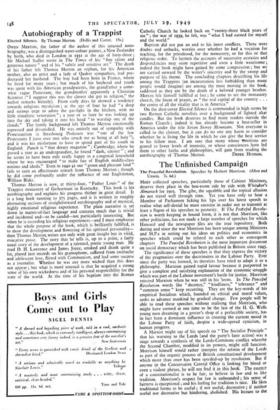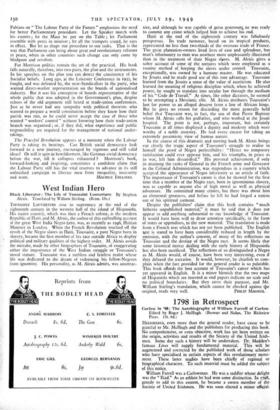The Unfinished Campaign
The Peaceful Revolution. Speeches by Herbert Morrison. (Allen and Unwin. 7s. 6d.)
MOST collected speeches, particularly those of Cabinet Ministers, deserve their place in the box-room side by side with Whitaker's Almanack for 1903. The gibe, the squabble and the topical allusion do not travel well through time. Yet you have only to hear a Member of Parliament licking his lips over his latest speech to realise what self-denial he must exercise in order not to transmit at least a flagon of his speeches to posterity. If The Peateful Revolu- tion is worth keeping in bound form, it is not that Morrison, like• other politicians, has not made a large number of speeches for which Hansard and the newspaper files are the true repository. Both during and since the war Morrison has been unique among Ministers and M.P.s in setting out his ideas on politics and economics in speeches which could be related to each other as consequent chapters The Peaceful Revolution is the most important document on social democracy which has been published in Britain since 5945.
The significance of these speeches is that they express the victory of the pragmatists over the doctrinaires in the Labour Party. Ever since the party was formed, its theorists have tried to adapt it to a philosophy. Marxism gained rapid favour because it purported to give a complete and satisfying explanation of the economic struggle which was part of the Labour movement's battle for justice. Morrison rejected Marxism when he was still in his 'teens. In The Peaceful Revolution words like "decency," "kindliness," " tolerance " and "common sense" keep recurring. They are the key-words of his empirical Socialism which, founded on ethical and moral values, seeks to advance mankind by gradual change. Few people will be able to read these speeches without realising that Morrison, who might have seemed at one time to be the last of the H. G. Wells young men dreaming in a grocer's shop of a perfectible society, has in fact been a dominant influence in creating the current mood in the Labour Party of faith, despite a wide-spread cynicism, in human progress.
A Marxist might say of his speech on "The Socialist Principle" that his warning to the Lords (and the party's later action) was a stage towards a synthesis of the Lords-Commons conflict whereby the Second Chamber, modified in its powers, might still function. Morrison himself would rather interpret the reform of the Lords as part of the organic process of British constitutional development which more than once has been speeded-up by revolution. But if anyone in the Conservative Central Office is looking for blood or even a violent phrase, he will not find it in this book. The essence of a constitutionalist is to be fair, to believe in law and to like tradition. Morrison's respect for law is unbounded ; his sense of fairness is exceptional ; and his feeling for tradition is nice. He likes traditional forms to be useful • if not useful, decorative ; if neither useful nor decorative but hindering, abolished. His lecture to the
Fabians on "The Labour Party of the Future" emphasises the need for better Parliamentary procedure. Let the Speaker march with his escorts ; let the Mace be put on the Table ; let Parliament assemble with peers in miniver ; let all the trumpets sound, he says in effect. But let us shape our procedure to our tasks. That is the way that Parliament can bring about great and revolutionary reforms in peace, when in other countries such change can only come by bludgeon and revolver. • For Morrison politics remain the art of the practical. His book falls naturally, therefore, into two parts, the plan and the instruments. In his speeches on the plan you can detect the consistency of his Socialist beliefs. Long ago, at the Leicester Conference in 1932, he fought, and was defeated by, the near-Syndicalists in the party, who wanted direct-worker representation on the boards of nationalised industry. But it was his conception of boards representative of the whole public that was adopted in the Government's plan, despite echoes of the old argument still heard at trade-union conferences. Just as he never had any sympathy with political theorists who wanted to prepare a world constitution before they knew how their parish was run, so he could never accept the case of those who wanted "workers' control" without knowing how their trade-union branch was organised ; or, if they did, what experience and public responsibility are required for the management of national under- takings.
The Peaceful Revolution appears at a moment when the Labour Party is taking its bearings. Can British social democracy look forward to a new journey, encouraged by vigorous and still valid ideas? Or will it spin in bewilderment, like German social democracy before the war, till it collapses exhausted ? Morrison's book, forward-looking and inspiring, constitutes a confident claim that the Labour Party still has the vital reserves to advance in its still unfinished campaign to liberate men from inequality, insecurity



































 Previous page
Previous page